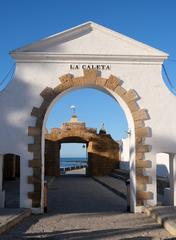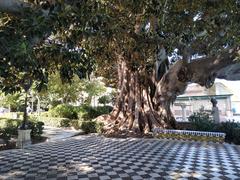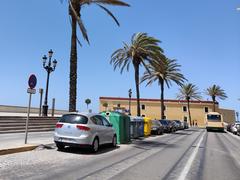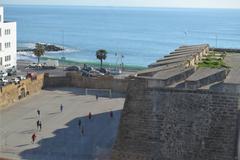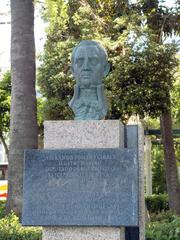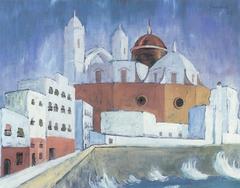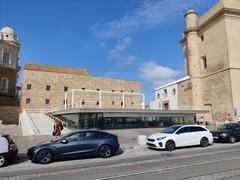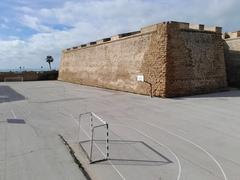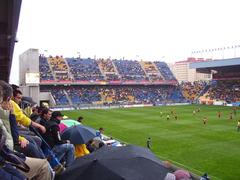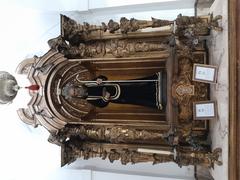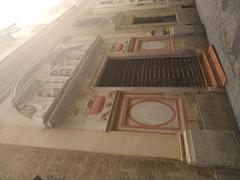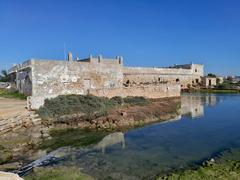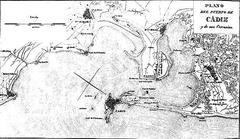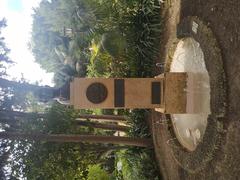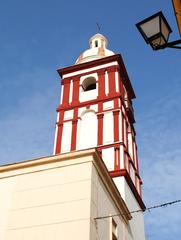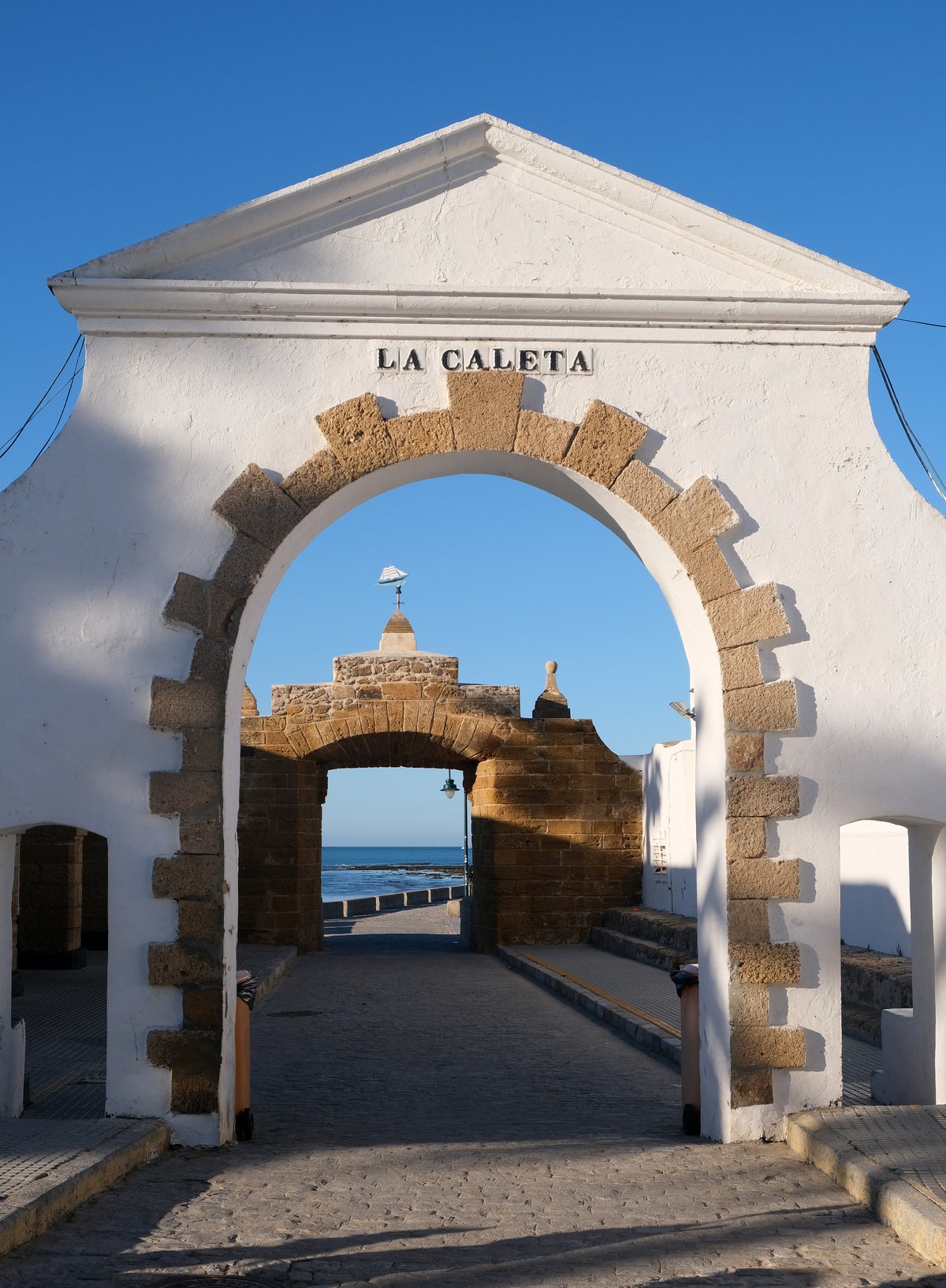
Puerta De La Caleta Visiting Hours, Tickets, and Comprehensive Guide to Cádiz Historical Sites
Date: 14/06/2025
Introduction
Puerta de la Caleta, located on the northwestern edge of Cádiz, Spain, serves as an iconic gateway between the historic city and the shimmering Atlantic at La Caleta Beach. With its robust double arches and centuries-old bastions, this open-air monument embodies Cádiz’s rich maritime heritage, enduring resilience, and strategic significance as one of Europe’s oldest continuously inhabited port cities. Whether you are captivated by architectural history, drawn to vibrant local festivals, or simply seeking a scenic stroll, Puerta de la Caleta offers a quintessential Cádiz experience (andalucia.com; exploredbymarta.com; visitcostablancaspain.com).
Contents
- Historical Background
- Origins and Early History
- Architectural Features and Defensive Role
- Symbolic and Civic Importance
- Visiting Information
- Hours and Tickets
- Accessibility
- Transportation & Amenities
- What to See and Do
- Promenade and Beach Activities
- Nearby Attractions
- Dining and Local Traditions
- Seasonal Tips and Travel Essentials
- Frequently Asked Questions (FAQ)
- Summary and Visitor Tips
- Sources and Further Reading
Historical Background
Origins and Early History
Cádiz’s roots stretch back to its founding by the Phoenicians around 1100 BCE, making it one of Europe’s oldest cities (andalucia.com). The natural harbor at La Caleta Beach was used by Phoenician, Carthaginian, and Roman traders, establishing Cádiz as a major maritime hub (villasflamenco.com). Defensive walls began to appear in the 12th century during the Islamic Almohad period, and the Puerta de la Caleta likely evolved from these medieval fortifications (encirclephotos.com).
Architectural Features and Defensive Role
The Puerta de la Caleta, or Caleta Gate, features two solid masonry arches anchored to the Baluarte del Orejón, part of Cádiz’s extensive 17th-century fortification system. Erected in response to increased maritime threats—including the devastating Anglo-Dutch attack of 1596—these defenses were expanded under King Felipe II (es.wikipedia.org). The gate controlled access between the city and the causeway leading to Castillo de San Sebastián, reinforcing the city’s protective barriers against naval incursions (miviaje.com).
Symbolic and Civic Importance
Beyond its military role, Puerta de la Caleta became a symbolic threshold, marking the transition from the city’s historic neighborhoods to the open Atlantic. It is a focal point for local traditions, religious processions, and cultural celebrations, notably the famed Cádiz Carnival (andaluciamia.com). The gate’s enduring presence links modern Cádiz to its ancient maritime legacy.
Visiting Information
Hours and Tickets
- Puerta de la Caleta: Open-air site, accessible 24/7, free of charge.
- Castillo de Santa Catalina: Tuesday–Sunday, 10:00 AM–6:00 PM, free entry (exploredbymarta.com).
- Castillo de San Sebastián: Open daily, seasonal hours, generally free or with a small fee for special events (thecrazytourist.com).
Always confirm current hours and ticketing with official sources before your visit.
Accessibility
- Promenade and Gateway: Wheelchair accessible with paved walkways and ramps. Some uneven surfaces exist, so caution is advised.
- Nearby Castles: Ramps and accessible paths are available. Some areas may be restricted due to preservation.
Transportation & Amenities
- On Foot: The gateway is a 10–15 minute walk from the city center and easily reached from the train station.
- Public Transport: Local buses and taxis are available. Parking is limited in the old town; a paid lot is near Santa Catalina Castle (amusedbyandalucia.com).
- Facilities: La Caleta Beach offers public toilets, showers, sunshade rentals, and accessible walkways (spain.info).
- Safety: Lifeguards are present during summer; the area is well-lit and generally safe.
What to See and Do
Promenade and Beach Activities
- Walking & Photography: The 600-meter Paseo Fernando Quiñones leads from Puerta de la Caleta to Castillo de San Sebastián, offering panoramic views—especially at sunset (exploredbymarta.com).
- Beach Time: La Caleta is Cádiz’s most atmospheric beach, ideal for swimming, sunbathing, or watching local fishermen.
- Festivals: The area is central to the Cádiz Carnival and Holy Week processions.
Nearby Attractions
- Castillo de Santa Catalina: 17th-century fortress with art exhibits and ramparts for city views.
- Castillo de San Sebastián: 18th-century fortress offering exhibitions and ocean panoramas.
- Underwater Archaeology Center: Housed in the former Balneario de la Palma, showcases artifacts from Cádiz’s maritime past (es.wikipedia.org).
- Historic Center: Explore narrow streets, Cádiz Cathedral, Torre Tavira, and Genovés Park (wanderlustchloe.com).
Dining and Local Traditions
- Cuisine: Sample tortillitas de camarones (shrimp fritters), pescaíto frito (fried fish), and other Andalusian tapas in the lively La Viña neighborhood (lovingspainlife.com).
- Chiringuitos: Beach bars serve seafood and drinks with ocean views.
Seasonal Tips and Travel Essentials
- Best Visiting Periods: Spring (April–June) and early autumn (September–October) offer mild weather and fewer crowds (visitingcadiz.com).
- Summer: Expect higher temperatures and more visitors, especially during festivals.
- What to Bring: Comfortable shoes, sunscreen, hat, swimwear, and a camera. A light jacket is useful for evenings.
- Language: Most signage is in Spanish; translation apps or guided tours can enhance your visit.
Frequently Asked Questions (FAQ)
Q: What are the visiting hours of Puerta de la Caleta?
A: The gateway is an open-air site, accessible at any time, free of charge.
Q: Are there entrance fees?
A: No fee for Puerta de la Caleta or La Caleta Beach. Nearby castles are generally free, with small charges for special events.
Q: Is the site accessible?
A: Yes, the promenade and gateway are wheelchair and stroller-friendly, though some surfaces are uneven.
Q: Are guided tours available?
A: Yes, Cádiz offers guided and self-guided walking tours covering Puerta de la Caleta and surrounding landmarks (visitingcadiz.com).
Q: When is the best time to visit?
A: Spring and early autumn are ideal. Sunset hours provide stunning views and a lively atmosphere.
Q: What facilities are nearby?
A: Public toilets, showers, sun loungers, and beach bars are available at La Caleta Beach.
Summary and Visitor Tips
Puerta de la Caleta is a living monument to Cádiz’s history, architectural ingenuity, and maritime spirit. Its double arches and bastions offer a tangible link to centuries of defense, trade, and cultural exchange. Visitors enjoy unrestricted free access, with the surrounding area providing scenic walks, historical exploration, and vibrant local life—especially during the renowned Cádiz Carnival.
For the best experience:
- Visit at sunrise or sunset for optimal light and atmosphere.
- Wear comfortable footwear and sun protection.
- Explore nearby castles and the historic city center.
- Sample local seafood and participate in guided tours for deeper insight.
- Plan ahead for festivals and check current schedules for attractions.
Sources and Further Reading
- Andalucia.com – History of Cádiz
- Explored by Marta – Bucket List Things to Do in Cádiz
- Visit Costa Blanca Spain – Cádiz Old Town
- Visiting Cádiz – Comprehensive Guide
- Spain.info – Cádiz Destination
- Miviaje – La Caleta: Much More Than an Urban Beach
- Encircle Photos – Gallery of Cádiz
- Es.wikipedia.org – Playa de La Caleta (Cádiz)
- Lovingspainlife.com – A City Guide to Cádiz, Spain
- Wanderlust Chloe – Cádiz Travel Guide
- Spain.info – La Caleta Beach
Plan your unforgettable Cádiz adventure starting at Puerta de la Caleta. Download the Audiala app for audio guides, local tips, and interactive maps. For more inspiration, follow us on social media and consult the official Cádiz tourism portal for up-to-date event and travel information!
